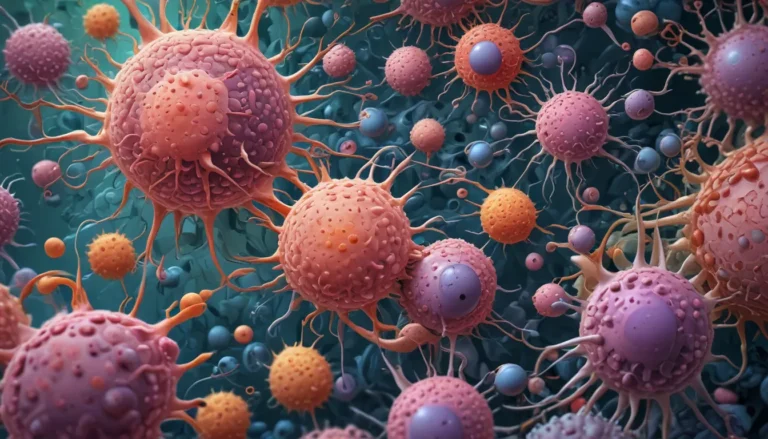A Note About Images: The images used in our articles are for illustration purposes only and may not exactly match the content. They are meant to engage readers, but the text should be relied upon for accurate information.
Immunology, the study of the immune system and its functions, is a crucial field that aids in understanding and combating diseases. Researchers and scientists have developed various techniques over the years to explore and manipulate the immune system for diagnostic and therapeutic purposes, leading to groundbreaking discoveries. In this article, we will delve into the world of immunology techniques and uncover 14 surprising facts that highlight the incredible advancements in this field. Each technique offers unique insights into the cellular and molecular aspects of immunology, shaping our understanding of the immune system.
Understanding Immunology: The Study of the Immune System
Immunology focuses on understanding how the immune system functions to protect the body from pathogens like bacteria, viruses, and parasites. It plays a crucial role in maintaining our overall health by distinguishing between harmful invaders and our body’s own cells, ensuring a proper immune response.
Importance of Vaccines in Immunology
Vaccines are a cornerstone of immunology, stimulating the immune system to produce an immune response without causing the actual disease. They play a vital role in preventing and controlling infectious diseases, showcasing the power of our immune system in combating harmful pathogens.
Monoclonal Antibodies: Versatile Tools in Immunology Techniques
Monoclonal antibodies are laboratory-produced molecules that mimic the immune system’s ability to fight off harmful pathogens. They are utilized in research, diagnosis, and treatment of diseases, showcasing their versatility and importance in immunology.
Flow Cytometry: A Window into the Immune System
Flow cytometry is a widely used immunology technique that allows scientists to analyze and quantify cells based on their physical and chemical characteristics. It provides valuable insights into the immune system’s response, enabling researchers to understand immune cell populations.
ELISA: Detecting Specific Proteins with Precision
Enzyme-Linked Immunosorbent Assay (ELISA) is a common immunology technique used to detect and quantify specific proteins in research and diagnostics. It aids in the diagnosis of various diseases by accurately identifying antibodies or antigens present in patient samples.
Visualizing Antigens with Immunohistochemistry
Immunohistochemistry involves visualizing specific antigens in tissue samples by using antibodies labeled with a marker. This technique aids in the diagnosis and prognosis of diseases by identifying and locating specific antigens within tissues.
Immunofluorescence: Illuminating Cellular Molecules
Immunofluorescence utilizes fluorescently labeled antibodies to detect and visualize specific proteins or antigens within cells. It offers valuable information about the distribution and function of molecules within cells, shedding light on cellular processes.
Cell Sorting Techniques: Isolating and Analyzing Specific Cell Populations
Cell sorting techniques, such as fluorescence-activated cell sorting (FACS), enable scientists to isolate and separate specific cell populations based on their surface markers. This technique allows for in-depth analysis and characterization of different cell types within the immune system.
Immunoprecipitation: Isolating Target Proteins with Precision
Immunoprecipitation involves isolating specific proteins from complex mixtures using antibodies. This technique selectively binds and isolates target proteins, facilitating further analysis and study of these proteins in various biological samples.
Complement Fixation Tests: A Diagnostic Tool for Specific Diseases
Complement fixation tests are used to diagnose diseases like syphilis and certain viral infections based on the interaction between antibodies and complement proteins. This diagnostic tool aids in identifying specific diseases by analyzing the immune response.
Immunomagnetic Separation: Isolating Specific Cells with Magnetic Beads
Immunomagnetic separation is a technique that involves labeling target cells with magnetic beads coated with specific antibodies for easy isolation and analysis. This method allows for the precise isolation of specific cells for further study.
Immunoenzymatic Staining: Visualizing Antigen-Antibody Interactions
Immunoenzymatic staining techniques, like immunoperoxidase staining, utilize enzymatic reactions to visualize antigen-antibody interactions in tissues. This technique provides a means to detect and localize specific antigens within tissues for diagnostic purposes.
Studying Gene Expression with RT-PCR
Reverse transcription-polymerase chain reaction (RT-PCR) is a technique used to convert RNA into complementary DNA (cDNA) and amplify specific target genes. This method aids in studying gene expression patterns in different cell types or tissues, providing insights into cellular functions.
Evolving Immunology Techniques: Embracing Technological Advancements
Immunology techniques continue to evolve with advancements in technology, such as single-cell sequencing and high-resolution imaging. These cutting-edge techniques revolutionize immunology research, offering detailed insights into the immune system’s role in health and disease.
Conclusion: Unleashing the Potential of Immunology Techniques
Immunology techniques are essential in understanding and harnessing the power of our immune system. They aid researchers and healthcare professionals in diagnosing and treating diseases, developing vaccines, and therapies. By studying immunology techniques, we can unlock the secrets of how our immune system works, leading to better health outcomes and advancements in medical science.
Immunology techniques, from flow cytometry to ELISA assays, continue to surprise us with their applications and capabilities. As we deepen our knowledge of the immune system, new and innovative techniques are being developed to diagnose, monitor, and treat various diseases. By embracing technological advancements and understanding the fundamental principles of immunology techniques, we can push the boundaries of medical science and enhance human health.
FAQs: Answering Your Questions on Immunology Techniques
-
What is the importance of immunology techniques?
Immunology techniques are crucial in understanding the immune system’s functions, diagnosing diseases, developing vaccines, and monitoring immune responses. -
What are some commonly used immunology techniques?
Commonly used immunology techniques include flow cytometry, ELISA assays, immunohistochemistry, and western blotting, aiding in the analysis of immune cells and proteins. -
How do immunology techniques contribute to medical research?
Immunology techniques enable scientists to study immune responses in diseases, providing insights into immune-related disorders and contributing to the development of novel therapies. -
What are some emerging immunology techniques?
Emerging immunology techniques like single-cell sequencing, mass cytometry, and CRISPR-based gene editing revolutionize the field, paving the way for personalized medicine and targeted therapies. -
Are immunology techniques only used in research settings?
No, immunology techniques are also utilized in clinical laboratories for diagnosing and monitoring diseases, showcasing their practical applications in healthcare settings.
Our commitment to delivering trustworthy and engaging content is evident in each fact on our site, contributed by real users like you. We prioritize accuracy and reliability, ensuring that the facts we share are not only fascinating but also credible. Explore and learn with us, trusting our dedication to quality and authenticity in every piece of content.
In this rewritten article, we have provided detailed insights into various immunology techniques, emphasizing the importance of these tools in understanding the immune system and combating diseases. By covering essential topics such as vaccines, monoclonal antibodies, and emerging technologies, we aim to educate and inspire readers about the fascinating world of immunology techniques.






